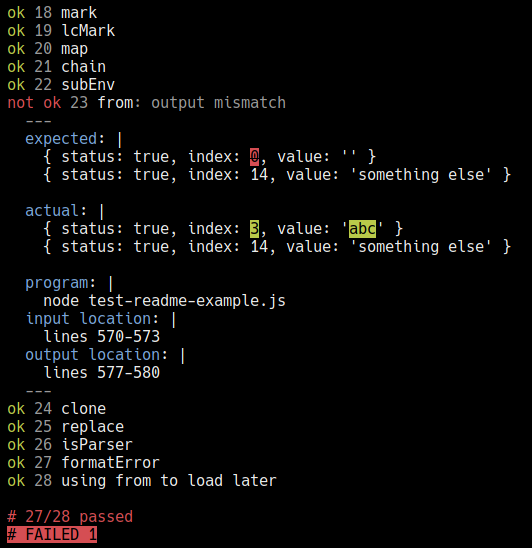tests-ex-markdown 


tool for testing your Markdown code examples
- language-agnostic (you can choose what program runs your code examples)
- clear diagnostics (colour diffs, line numbers, stdout, stderr, exit code, …)
- hidden (only requires annotations in HTML comments; the document renders the same!)
- TAP output (easy to read, compatible with many other tools)
examples
# async The [async][1] library for [Node.js][2] contains functions that abstract overvarious asynchronous operations on collections. For example: <!-- !test program node --> <!-- !test in simple example --> const async = require('async') async.map( [1, 2, 3], // Input collection (number, callback) => callback(null, number + 1), // Mapper (error, value) => console.log(value) // Finish callback ) The output is: <!-- !test out simple example --> [ 2, 3, 4 ] [2]: https://caolan.github.io/async/[2]: https://nodejs.org/$ txm README.mdTAP version 131..1ok 1 simple example# 1/1 passed# OK
Example: Testing C code with GCC
You can use whatever you want as the !test program:
<!-- !test programcat > /tmp/program.cgcc /tmp/program.c -o /tmp/test-program && /tmp/test-program --> <!-- !test in printf --> #include <stdio.h> int main () { printf("%d\n", 42); } <!-- !test out printf --> 42TAP version 13 1..1 ok 1 printf # 1/1 passed # OK
Example: Replacing require('module-name') with require('./index.js')
Your users are using your library by calling require with its package name
(e.g. require('module-name'). However, it makes sense to actually run tests
on the local implementation at require('./index.js'), or whatever is listed
as the main file in package.json.
So let's just replace those require calls before passing it to node!
<!-- !test program# First read stdin into a temporary fileTEMP_FILE="$(mktemp --suffix=js)"cat > "$TEMP_FILE" # Read the package name and main file from package.jsonPACKAGE_NAME=$(node -e "console.log(require('./package.json').name)")LOCAL_MAIN_FILE=$(node -e "console.log(require('./package.json').main)") # Run a version of the input code where requires for the package name are# replaced with the local file pathcat "$TEMP_FILE" \| sed -e "s/require('$PACKAGE_NAME')/require('.\\/$LOCAL_MAIN_FILE')/" \| node--> <!-- !test in use library --> // In our case, requiring the main file just runs the program require('tests-ex-markdown') <!-- !test out use library --> TAP version 13 1..0 # no tests # For help, see https://github.com/anko/tests-ex-markdownTAP version 13 1..1 ok 1 use library # 1/1 passed # OK
Example: Testing stdout and stderr output in the same code block
Prepending 2>&1 to a shell command redirects stderr
to stdout.
<!-- !test program 2>&1 node --> <!-- !test in print to both stdout and stderr --> console.error("This goes to stderr!") console.log("This goes to stdout!") <!-- !test out print to both stdout and stderr --> This goes to stderr! This goes to stdout!TAP version 13 1..1 ok 1 print to both stdout and stderr # 1/1 passed # OK
Example: Testing a program with non-zero exit status
Put || true after the program, and the shell will swallow the exit code. If
you don't, txm assumes all programs that exit non-zero must have
unintentionally failed.
<!-- !test program node || true --> <!-- !test in don't fail --> console.log("Hi before throw!") throw new Error("AAAAAA!") <!-- !test out don't fail --> Hi before throw!TAP version 13 1..1 ok 1 don't fail # 1/1 passed # OK
Example: Testing examples that call assert
If your example code calls assert or such (which throw an error and exit
nonzero when the assert fails), then you don't really need an output block,
because it already documents itself. In such cases you can use a !test check
annotation.
<!-- !test program node --> <!-- !test check laws of mathematics --> const assert = require('assert') assert(1 + 1 == 2) TAP version 13 1..1 ok 1 laws of mathematics # 1/1 passed # OK
Example: This readme!
usage
txm [--jobs <n>] [filename]
filename: Input file (default: readstdin)--jobs: How many tests may run in parallel (default: number of CPU cores)--version--help
txm exits 0 if and only if all tests pass.
Annotations (inside HTML comments):
-
####
!test program <program>The
<program>is run as a shell command for each following matching input/output pair. It gets the input onstdin, and is expected to produce the output onstdout.To use the same program for each test, just declare it once.
-
####
!test in <name>/!test out <name>/!test err <name>The next code block is read as given input, or expected stdout or stderr.
These are matched by
<name>, and may be anywhere. -
####
!test check <name>The next code block is read as a check test. The previously-specified program gets this as input, but its output is ignored. The test passes if the program exits
0.Use this for code examples that check their own correctness, (e.g. by calling
assert), or if your test program is a linter.
Note that 2 consecutive hyphens (--) inside HTML comments are disallowed by
the HTML spec. For this reason, txm lets you escape
hyphens: #- is automatically replaced by -. If you need to write literally
#-, write ##- instead, and so on. # acts normally everywhere else.
screenshot
